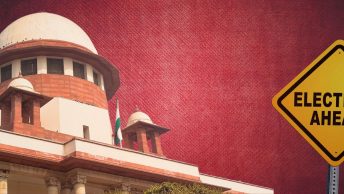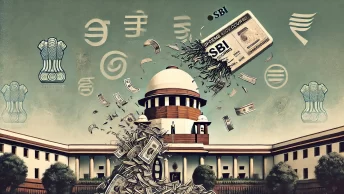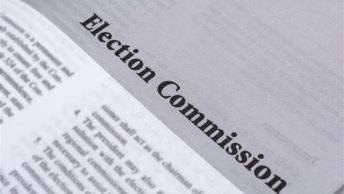Summary: The article argues that the interim arrangement given by the SC in the Anoop Baranwal case represents a constitutional statute with the twin essential minimum content of: a. Independence from executive dominance, and b. Effective opposition participation. The recent appointment act formulated by the parliament reneges on both these aspects and hence, must be struck down with the interim arrangement revived.
The President, on 28th Dec 2023, gave her assent to The CEC And Other Election Commissioners (Appointment, Conditions of Service and Term of Office) Act to regulate the appointment, conditions of service, and term of Office for CEC and other Election Commissioners.
The Act formed a three-member committee consisting of – the Prime Minister, the Leader of the Opposition in Lok Sabha, and a Union Cabinet Minister as nominated by the PM, thereby entrenching the executive majority in the committee. The newly constituted committee recently appointed two election commissioners after the resignation of the previous CEC- Arun Goel.
The Act has been criticized as reneging on the Anoop Baranwal Judgment, passed earlier by the SC, which stressed the need for an independent appointment procedure for CEC and Election Commissioners to ensure the institutional Independence of the Election Commission, which is a necessary concomitant to ensuring a level playing field for the conduct of free and fair elections.
Arguments against the new committee have been made primarily from the angle of ensuring the independence of Fourth Branch Institutions. In this piece, I take the argument further to argue that the temporary committee set up by the court in the Anoop Baranwal represents a ‘Constitutional Statute,’ which prompts the court to strike down the Act as it is a regression from the essential minimum content required to fulfill the Parliament’s positive obligations under Article 324(2).
A Brief background
Constitutional Statutes are statutes enacted in pursuance of the State’s positive obligation to fulfill a constitutional/fundamental right (Article 15(3) or Article 21) as contrasted with obligations arising from negative rights like (Article 19, Article 17), which are primarily directed against the State and act to prevent encroachment from the State.
However, not all laws implementing a fundamental right can be said to constitute Constitutional Statutes, and rather only those statutes formed as a result of express delegation of legislative power upon the Parliament or those which structure the relationship between the individual and the State are said to constitute constitutional statutes.
There are twin implications of holding a statutory framework as being a constitutional statute-first, the statutory framework then is instilled with certain essential minimum content necessary for effectively fulfilling the right; and second, Any subsequent statute that derogates or reduces such minimal content must be held to be unconstitutional, and the existing framework must be restored – non-retrogression.
This minimum content is essential to effectively fulfill the right in question, which includes respecting certain ancillary or incidental aspects necessary for enjoying that right.
For ex- in the Visakha case, the court held that sexual harassment at the workplace violated the dignity of women and held it as violative of articles 14 and 15 of the constitution. The court then, noticing the legislative vacuum, gave a set of guidelines in the interim, superseded by Parliament, making the Sexual Harassment of Women at Workplace Act 2013. Central to the Visakha Guidelines was taking into account the dignity and privacy of victims of sexual harassment (essential minimum content), which were incorporated in the Act through provisions for the timely disposal of complaints, mandatory constitution of ICC with the requirement of women at its head, and no less than half of its members being women, amongst others.
Any subsequent amendment to this Act can make changes (like changing the composition of ICC); however, if such change is so drastic as to affect privacy or dignity concerns adversely (like removing any requirement of women members in the ICC altogether, or prescribing procedures which adversely affect the confidentiality of the proceedings), then such amendment will have to be struck down for violating the rights under Articles 14 and 15.
Does Article 324(2) necessitate a Constitutional Statute?
Article 324(2) mandates that “… the appointment of the Chief Election Commissioner and other Election Commissioners shall, subject to the provisions of any law made in that behalf by Parliament, be made by the President.” In this section, I show that any law framed under Article 324(2) contains both the essentials of a constitutional statute.
A. Furthers a Constitutional Right
Both Justice Joseph’s Majority Judgment and Justice Rastogi’s concurring opinion ground the Right to Vote in Article 326 of the Constitution. While the majority opinion holds this as a constitutional right to vote, Justice Rastogi goes ahead to ground the right to vote as a fundamental right flowing through Articles 15, 17, 19, 21, as well (para 68-69, Rastogi J.).
Nevertheless, both conceptions then extend this to the larger value of free and fair elections, an ancillary to which is the need to ensure the independence of the institutional mechanism through which such elections are carried out, i.e., the Election Commission. This interpretive exercise helped both opinions link the parliament’s power to appoint CEC and Election Commissioners to further the right to vote under Article 326.
B. Structures the relationship between the Citizen and State
A close look at the Anoop Baranwal Judgment, and the structure of Article 324 itself, shows that the constitution envisaged Parliament’s power under Article 324 to be structurally constrained as to ensure that the commission retains its independence.
The structure of Article 324 itself specifies some constitutional limits on laws related to “Conditions of Service and Tenure of Office” ensuring that they are not changed to their disadvantage after appointment and removal from the Office of CEC and Election Commissioners, who can be removed only on like grounds as Judges of Supreme Court, the larger purpose behind the constitutional limits being to guard their independence from the executive.
Furthermore, the judgment explicitly recognizes the varied roles played by the Election Commission, from the grant of election symbols to the disqualification of parties, adjudicating split between parties, which are essentially quasi-judicial functions. This forms the core of the Majority Opinion’s reasoning against the existing appointment procedure, i.e., it makes the executive a dominant player in determining the structure of an institution, which may decide disputes related to the executive itself (which corresponds to the party in power). This violated the separation of powers, which the Majority opinion entrenched within Article 14 itself.
Thus, the judgment recognizes that Article 324 structures the relationship between citizen and state by mandating that to fully enjoy citizen’s right to vote, there must be constraints upon state power in election commission’s functioning.
The twin (Right-based and structural) arguments provide that a statute framed for fulfilling the obligations laid upon the Parliament under Article 324 will be a Constitutional Statute.
Constitutional Statute in Action
The court thus uses the structure of Article 324 and the separation of powers doctrine to strike down the ad-hoc appointment procedure established through the Transaction of Business Laws as an insufficient guarantee of the Independence of the Election Commission, which directly affects the effective exercise of the constitutional right to vote.
However, The Court then goes one step forward, recognizing that the legislative vacuum throughout 75 years directly contributed to executive aggrandizement, engaged in a gap-filling exercise by proposing a temporary committee consisting of – the Chief Justice of India, the Prime Minister, and the Leader of Opposition, which will decide the necessary appointments, until the Parliament may by law specify an alternative scheme. (para 229-231, Joseph J.)
The judgment’s analysis and the temporary framework embody two essential minimum content that should be present in any such appointment scheme –
- The framework must ensure that executive dominance in selection is curbed – Independence Aspect.
- The framework must ensure a valuable opportunity for the engagement of the Opposition in the appointment process – the Partisanship Aspect.
Such a framework aligns with how other countries have tried to regulate such Fourth-Branch Institutions. As has been argued, the Independence Aspect is essential to enforcing a non-self-enforcing norm like participative democracy, which the party in power has no incentive to promote lest it result in their ouster.
On the Partisanship Aspect, Tarunabh Khaitan argues that, unlike other regulatory agencies, the goal of guarantor institutions like the Election Commission is not to de-politicize their functions but to “de-partisanise” them. This character of guarantor institutions is essential for their legitimacy, which is achieved not only by the confidence of the winner of the electoral race but also of the opposing parties. However, to gain the legitimacy of opposition parties, it is essential that their participation must be meaningful and effective, not merely illusory.
The temporary committee suggested by the SC achieves the twin aspects by making the executive’s (PM) preference subject to the majority vote, which requires an affirmative vote by either the CJI, The Leader of the Opposition, or both.
The CEC And Other Election Commissioners (Appointment, Conditions of Service, and Term of Office) Act reneges on both aspects –
- It entrenches Executive Dominance in the Appointment Process by making two votes out of the three-member committee belonging to the Executive (PM and Union Cabinet Minister).
- This is coupled with the fact that there is no veto power or a requirement of Concurrence within the committee’s decision-making process, reducing the Opposition’s participation to a mere procedural formality.
Such executive aggrandizement inevitably played out during the first two appointments made by the Newly Formed Committee, in which neither the full details and particulars of the prospective candidates were circulated in a timely manner, nor the dissent by the only opposition figure was given its due prominence, reducing the Opposition’s participation to a mere sham.
In this instance, the Principle of Non-Retrogression should apply to the Act and hold it unconstitutional for derogating/ deleting the minimum content required by any legislative framework to discharge its obligations under Article 324. The Act thus, violates the constitutional right to vote under Article 326, which requires an efficient and independent institutional mechanism for its effective fulfillment.
An essential qualification is necessary here: the striking down of the Act will not revive the old appointment procedure under the Transaction of Business Rules, but rather, the Interim Arrangement proposed by the SC in Anoop Baranwal will be revived for it was issued under the Court’s Article 142 power and operates as a law until Parliament supersedes it by a “valid” law.
Conclusion
The Act, in its statement of Objects and Reasons, argues that the court, in Anoop Baranwal Judgment, declared that the Parliament should make the law for appointment to the Election Commission, upon which the interim arrangement by the court will be superseded. However, I have argued in this piece that this is an incomplete (and dishonest) reading of the ratio in Anoop Baranwal, which circumscribed Parliament’s Power to ensure some essential minimum content like Independence and Effective Opposition Participation in any appointment process it makes.
The Act formed by the Parliament ignores both the necessary elements and further entrenches appointment procedure in the executive’s hand, which is a derogation of the constitutional right to vote under Article 326 and the spirit of the Anoop Baranwal judgment and must be struck down by the court.
Prabhash Pandey is an undergraduate student in Law at NALSAR University and has a keen interest in public law.
Ed Note: This article has been edited by Sohina Pawah and published by Harshitha Adari from the Student Editorial Board.






